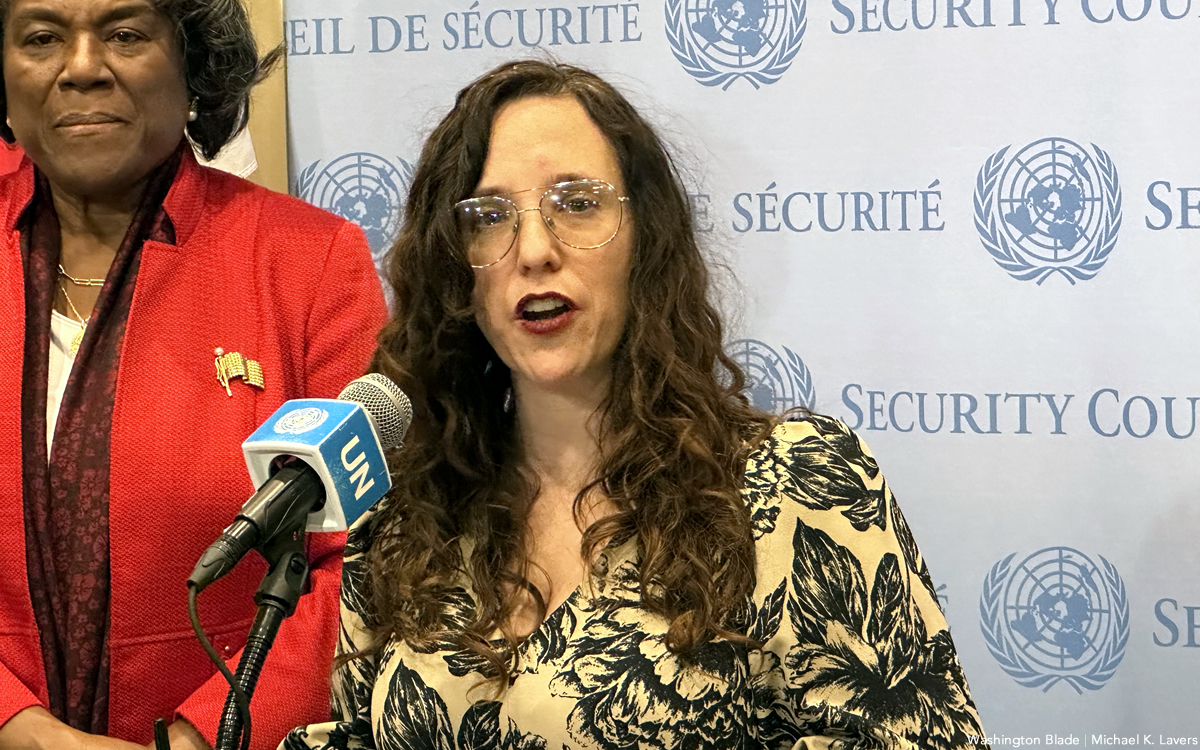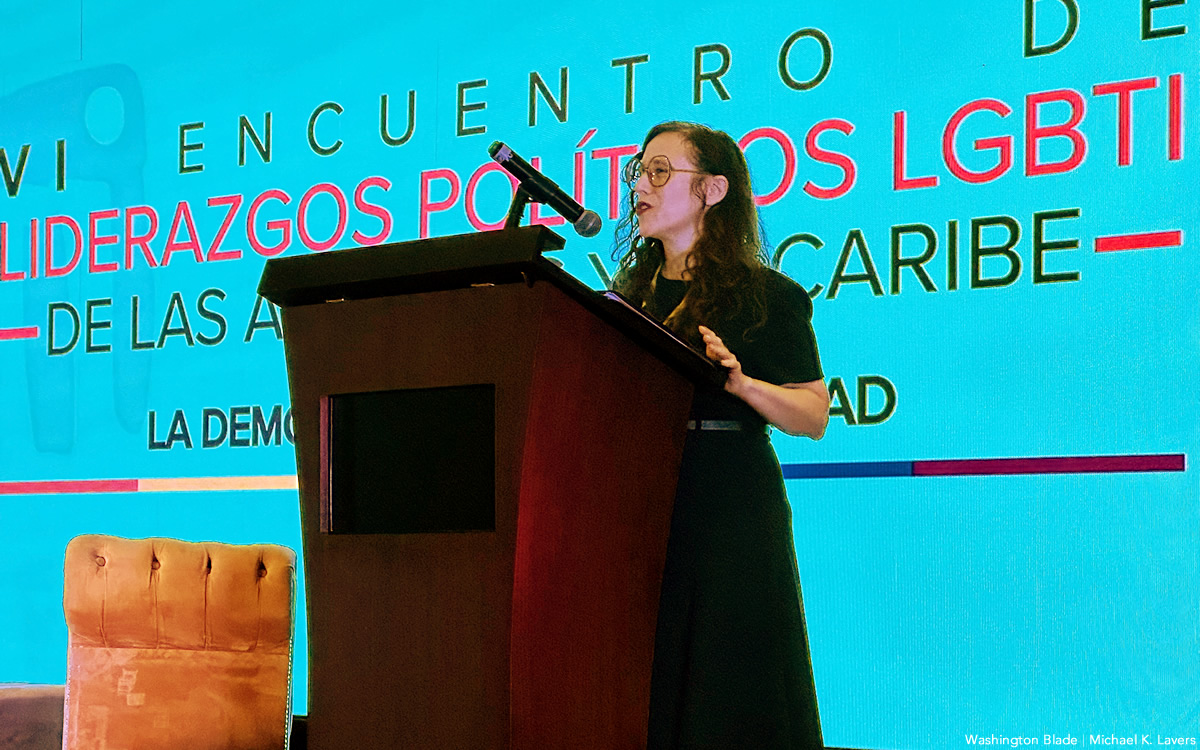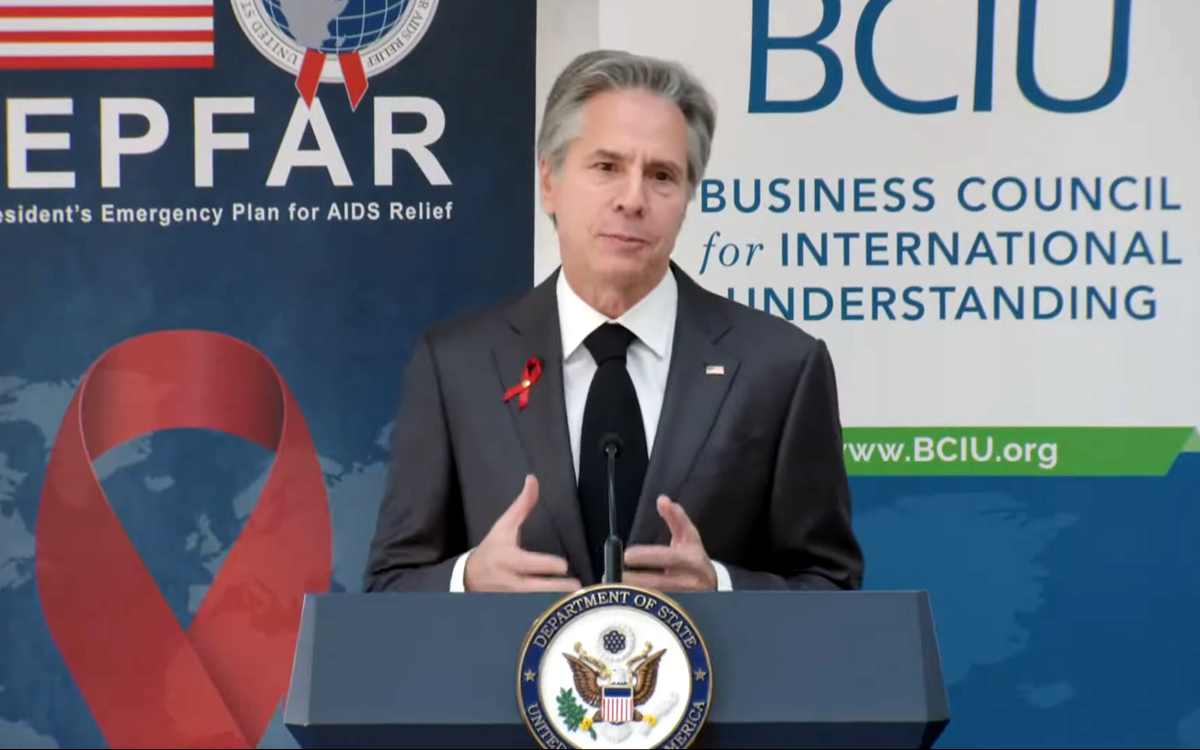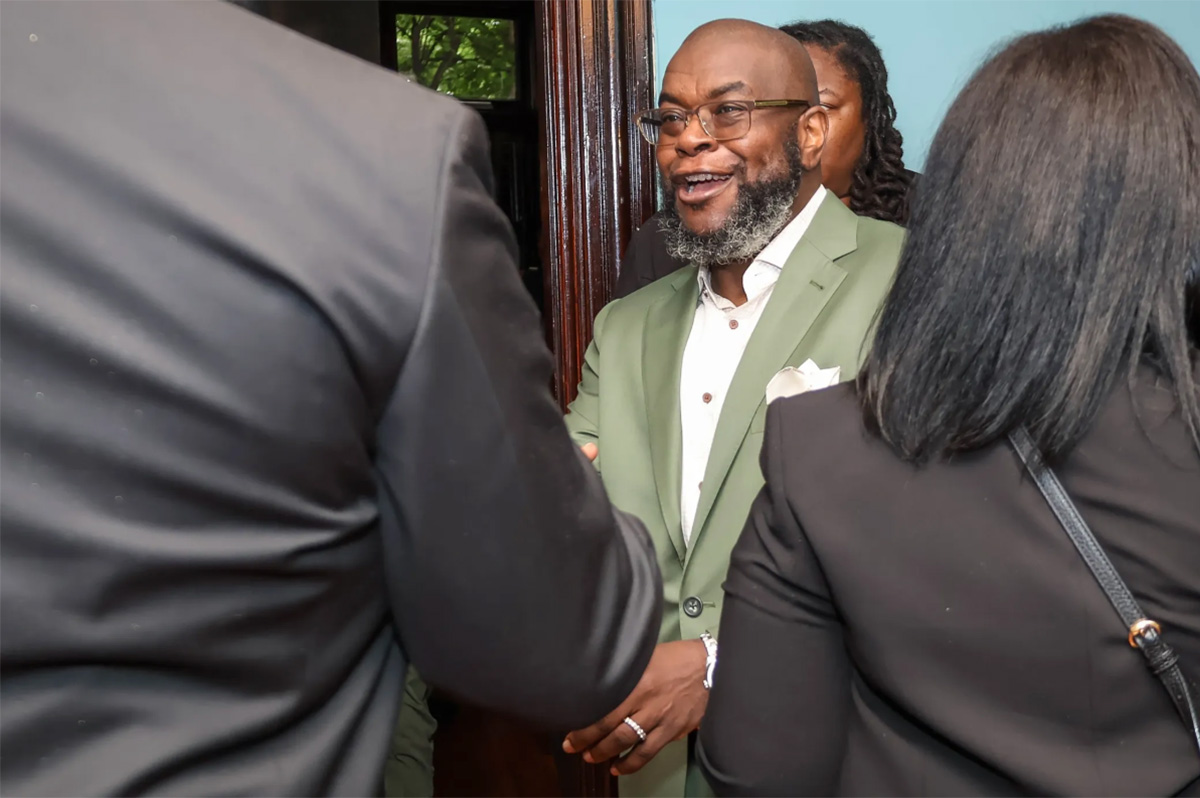National
‘Don’t Ask, Don’t Tell’ comes to an end
Burden on gay, lesbian service members lifted Tuesday


An estimated 2 million U.S. service members were trained on gay-related issues in the run-up to next Tuesday’s lifting of the military’s gay ban. (Washington Blade file photo by Michael Key)
As gay and lesbian troops await the end of the 18-year-old ban on openly gay service members on Tuesday, observers say the change will have significant impact beyond the military.
“Don’t Ask, Don’t Tell” will finally be lifted from the books thanks to the certification of repeal that President Obama, Defense Secretary Leon Panetta and Chairman of the Joint Chiefs of Staff Adm. Mike Mullen sent to Congress on July 22. In accordance with the repeal law that President Obama signed in December, certification started a 60-day timeclock for the end of the ban on Sept. 20.
Aaron Belkin, author of “How We Won,” a book on the lessons learned for progressive causes resulting from “Don’t Ask, Don’t Tell” repeal, said the end of the military’s gay ban represents the end of what he called the “political paranoia” that led to the institution of the law in 1993.
“Just abstracting away from the question of LGBT rights that’s a danger to every American citizen,” Belkin said. “Sept. 20 is about the cultural change for the military and the political change for gay and lesbian troops … but I would say, even more importantly, it’s a moment when truth and fairness trumped paranoia, and that’s just critical.”
Jeff Krehely, director of the LGBT research and communications project at the Center for American Progress, said allowing open service will be significant for many Americans.
“‘Don’t Ask, Don’t Tell’ repeal is huge and tremendous, but I think there are much larger implications for society because a lot of people really respect the military,” Krehely said.
Observers agree the process that led to the end of “Don’t Ask, Don’t Tell” will have a lasting impact as well.
Alex Nicholson, executive director of Servicemembers United, said the training in which service members have been participating will have significant influence on the perspective with which troops — and the American public at large — view gay and lesbian people.
“They really took the time to train and educate the force on the various assets of this policy and hypotheticals,” Nicholson said. “It was an hour of instruction on gays and lesbians, on gay families, on gay partners and it was a really a normalization routine. It was really exposed to millions of America’s most conservative youth to the normality of gays and lesbians.”
Among the situations that the training addressed, Nicholson said, were gay troops holding hands, going on dates or participating in military events with their partners. Nearly 2 million service members received the “Don’t Ask, Don’t Tell” training before certification took place on July 22, according to the Pentagon.
Workplace discrimination against LGBT people could be an issue that gains new focus after “Don’t Ask, Don’t Tell” repeal. No federal law exists to protect LGBT workers against discrimination. Firing someone for being gay is legal in 29 states and firing someone for being transgender is legal in 35 states.
Krehely said open service could generate support for the Employment Non-Discrimination Act, which would prohibit discrimination against LGBT workers in most situations in the public and private workforce, or encourage other employers to add protections for LGBT workers.
“The military is probably one of the biggest and most visible workplaces in our country,” Krehely said. “I think Sept. 20 is a clear indication that this discrimination should not be there any longer, and that we need to move forward on ENDA, and educate people about the broader workplace issues that we’re up against.”
Despite the potential for long-term impact, advocates say the change resulting in the end of “Don’t Ask, Don’t Tell” won’t be immediately apparent and any impact of any lifting the gay ban will be more drawn out.
Krehely said the end of “Don’t Ask, Don’t Tell” next week won’t mean the “world changes necessarily” on Tuesday.
“I think that it’s just people who want to serve their country will want to do that without living in fear,” Krehely said. “That’s the biggest change. It may not be visible, but it’s really important to those people and it’s really important to the military itself.”
Nicholson predicted Tuesday will be a “non-event” and said many gay service members will choose not to come out even though they won’t be in danger of dismissal now that the military’s gay ban is off the books.
“I think you’ll see a good number of them who decide not to come out,” Nicholson said. “I think the post-repeal military is going to resemble any conservative American workplace where individuals judge their willingness and their comfort level in coming out.”
According to the most recent findings from the Williams Institute at the University of California in Los Angeles, an estimated 48,500 lesbians, gay men and bisexuals serve on active duty or in the ready reserve in the U.S. military, while an additional 22,000 are in standby and retired reserve forces. These 70,500 service members make up 2.2 percent of the total force.
But what will happen to those service members who choose to be public about their sexual orientation? Will service members patronize their local gay bars while in uniform? Will Pride parades include contingents of openly gay troops?
Some gay troops have already started brandishing their military credentials during Pride celebrations. In July, about 200 active-duty troops and veterans marched in San Diego’s Pride parade. They weren’t wearing uniforms, but T-shirts indicating their branch of service. The event was the first time a military contingent participated in a Pride celebration in the United States.
Nicholson said that the standards that apply to straight service members with regard to uniforms will also apply to gay troops — so wearing the uniform may not be appropriate in some circumstances.
“Unless it’s some unusual circumstances, service members don’t wear their uniforms out to the bar,” Nicholson said. “I can pretty much guarantee that violations of long-standing and well-understood regulations like that for the sake of publicity is going to be frowned upon by gay troops because the community consensus is they want to blend in like everyone else and not have any special treatment.”
Nonetheless, gay troops will undoubtedly be visible in the post-repeal world. Belkin said the higher visibility of gay troops — and their relationships — following the end of “Don’t Ask, Don’t Tell” will add to the political pressure to advance the fight for same-sex marriage.
“We’re going to see gay and lesbian service members coming back from the Middle East and talking about the importance of marriage equality, and, very tragically, we’re going to see gay and lesbian service members fall in the battlefield and their partners, husbands and wives will not be dealt any benefits their straight counterparts have,” Belkin said. “That is going to illustrate for the public in a much more vivid way the stakes of the marriage debate.”
What’s the next frontier for those who worked to repeal “Don’t Ask, Don’t Tell?” Securing benefits for gay and lesbian troops is the next step advocates plan to take after the gay ban is lifted from the books.
The Defense of Marriage Act, which prohibits federal recognition of same-sex marriage, prevents the military from offering benefits to gay troops, such as health care benefits. But other benefits related to housing and legal services could be changed administratively.
Krehely said benefits for gay troops will be among the issues advocacy groups will be pushing for in the post-repeal world.
“I think that there are still some implementation issues that need to be worked out in terms of benefits and housing, and I think that’s something advocacy organizations and research groups are going to keep trying to make some progress on,” Krehely said.
Federal Government
Mass HHS layoffs include HIV/AIDS prevention, policy teams
Democratic states sue over cuts

Tuesday began a series of mass layoffs targeting staff, departments, and whole agencies within the U.S. Department of Health and Human Services under Secretary Robert F. Kennedy Jr., who reportedly plans to cut a total of 10,000 jobs.
On the chopping block, according to reports this week, is the Office of Infectious Disease and HIV/AIDS Policy. A fact sheet explaining on the restructuring says “a new Administration for a Healthy America (AHA) will consolidate the OASH, HRSA, SAMHSA, ATSDR, and NIOSH, so as to more efficiently coordinate chronic care and disease prevention programs and harmonize health resources to low-income Americans.”
The document indicates that “Divisions of AHA include Primary Care, Maternal and Child Health, Mental Health, Environmental Health, HIV/AIDS, and Workforce, with support of the U.S. Surgeon General and Policy team.”
“Today, the Trump administration eliminated the staff of several CDC HIV prevention offices, including entire offices conducting public health communication campaigns, modeling and behavioral surveillance, capacity building, and non-lab research,” said a press release Tuesday by the HIV + Hepatitis Policy Institute.
The organization also noted the “reassignments” of Jonathan Mermin, director of the National Center for HIV, Viral Hepatitis, STD, and TB Prevention, and Jeanne Marrazzo, director of the National Institutes of Health’s National Institute of Allergy and Infectious Diseases. Both were moved to the Indian Health Service.
“In a matter of just a couple days, we are losing our nation’s ability to prevent HIV,” said HIV + Hepatitis Policy Institute Executive Director Carl Schmid. “The expertise of the staff, along with their decades of leadership, has now been destroyed and cannot be replaced. We will feel the impacts of these decisions for years to come and it will certainly, sadly, translate into an increase in new HIV infections and higher medical costs.”
The group added, “We are still learning the full extent of the staff cuts and do not know how the administration’s announced reorganization of HHS will impact all HIV treatment, prevention, and research programs, including President Trump’s Ending the HIV Epidemic initiative,” but “At the moment, it seems that we are in the middle of a hurricane and just waiting for the next shoe to drop.”
A group of 500 HIV advocates announced a rally planned for Wednesday morning at 8 a.m., at the U.S. Capitol lawn across from the Cannon House Office Building, which aims to urge Congress to help stop the cuts at HHS.
“Over 500 advocates will rally on Capitol Hill and meet with members of Congress and Hill staff to advocate for maintaining a strong HIV response and detail the potential impact of cuts to and reorganization of HIV prevention and treatment programs,” the groups wrote.
The press release continued, “HHS has stated that it is seeking to cut 10,000 employees, among them 2,400 CDC employees, many doing critical HIV work. It also seeks to merge HIV treatment programming into a new agency raising concerns about maintaining resources for and achieving the outstanding outcomes of the Ryan White HIV/AIDS Program.”
On Tuesday a group of Democratic governors and attorneys general from 23 states and D.C. filed a lawsuit against HHS and Kennedy seeking a temporary restraining order and injunctive relief to halt the funding cuts.
U.S. Centers for Disease Control and Prevention withdrew approximately $11.4 billion in funding for state and community health departments during the COVID-19 pandemic response, along with $1 billion to the Substance Abuse and Mental Health Services Administration.
“Slashing this funding now will reverse our progress on the opioid crisis, throw our mental health systems into chaos, and leave hospitals struggling to care for patients,” New York Attorney General Letitia James said.
State Department
Former US envoy for global LGBTQ, intersex rights slams Trump
Former President Joe Biden appointed Jessica Stern in 2021

Jessica Stern, the former special U.S. envoy for the promotion of LGBTQ and intersex rights, says the work that she and her colleagues did under the Biden-Harris administration is “being systematically dismantled.”
“As the person who was responsible for leading U.S. foreign policy on LGBTQI+ issues, it’s been very difficult for the past two months to see that work being systematically dismantled,” she told the Washington Blade on March 19 during a telephone interview.
Stern was the executive director of Outright International, a global LGBTQ and intersex advocacy group, when then-President Joe Biden appointed her in June 2021.
The promotion of LGBTQ and intersex rights was a cornerstone of the Biden-Harris administration’s overall foreign policy. These efforts specifically included the decriminalization of consensual same-sex sexual relations and marriage equality efforts in countries where activists said they were possible through the legislative or judicial processes.
The Trump-Vance administration’s decision to freeze most U.S. foreign aid spending for at least 90 days has had a devastating impact on the global LGBTQ and intersex rights movement. President Donald Trump’s executive order that bans the State Department from issuing passports with “X” gender markers has prompted Germany and several other European countries to issue travel advisories for transgender and nonbinary people who are planning to visit the U.S.
Stern said the Trump-Vance administration “has studied the anti-LGBTQI strategies of other countries and basically imported the worst ideas from around the world: The most violent, the most dehumanizing, the most targeting strategies.” Stern added these policies have emboldened Hungarian Prime Minister Viktor Orbán, Russian President Vladimir Putin, Argentine President Javier Milei and other anti-LGBTQ heads of state.
“It’s one thing when a small country that has limited global reach implements anti-LGBTQI laws and policies. It’s another thing when one of the world’s superpowers does so,” Stern told the Blade. “There’s no question that the U.S.’s regression on LGBTQI rights is actually going to accelerate backlash against LGBTQI people around the world.”
“We provide political legitimacy to those ideas, but also we’re forging new alliances and coalitions, and we’re pushing these ideas on other countries,” she added. “So, it’s not a passive action. The U.S. government currently is actively funding and disseminating anti-LGBTQI hatred around the world.”
Former State Department colleagues ‘afraid every day’
The Trump-Vance administration in a Feb. 3 statement that defended its efforts to dismantle the U.S. Agency for International Development noted examples of the organization’s “waste and abuse” included $2 million for “sex changes and ‘LGBT activism'” in Guatemala and $1.5 million to “advance diversity, equity and inclusion in Serbia’s workplaces and business communities.” Secretary of State Marco Rubio last month said 83 percent of USAID contracts have been cancelled, and the remaining will “now be administered more effectively under the State Department.”
Rubio after the Trump-Vance administration froze nearly all U.S. foreign aid spending issued a waiver that allowed the President’s Emergency Plan for AIDS Relief and other “life-saving humanitarian assistance” programs to continue to operate.
The Blade has previously reported PEPFAR-funded programs in Kenya, South Africa, and elsewhere have suspended services and even shut down because of a lack of U.S. funding. UNAIDS Executive Director Winnie Byanyima on March 24 said 6.3 million more people around the world will die of AIDS-related complications over the next four years if the U.S. does not fully restore its foreign assistance.
Stern said her former State Department colleagues are “afraid every day.”
“They never know, ‘Am I going to be fired today?’ “Am I going to be put on administrative leave?’,” she said. “I cannot even imagine what it’s like to go to work every day.”
Stern told the Blade her former colleagues tell her that “there’s not a lot of foreign policy work happening because there’s so much disruption being caused by DOGE (the Department of Government Efficiency).”
“Entire departments have been decimated,” she said, noting one of them has lost 60 people. “It’s almost inconceivable to figure out how to restructure your work when your resources have been decimated.”

Stern described herself as “an eternal optimist” when the Blade asked whether she thinks the U.S. can ever stand for LGBTQ and intersex rights abroad.
“You have to believe in human rights,” she said.
Stern said former Secretary of State Antony Blinken as “an ally on LGBTQI issues.” Stern also said many of her now former State Department colleagues thanked her and her team for their work before they left government.
“There’s so much compassion from straight and cisgendered allies, from career officials, people that are not human rights experts or specialists, people that don’t focus on the well-being of LGBTQI people, but people that care very much about the United States standing for its values, the rule of law, equality for all, and this notion that it is in our national interest to ensure that there is safety, prosperity, and well-being for people around the world,” she said.
“The situation we find ourselves in will not last forever,” added Stern. “What we have to do is figure out how to hold the line right now, and how to organize for the future.”
She stressed ways to “hold the line” include litigation, protests, letters-to-the-editor, demanding accountability from lawmakers.
“There’s so much to do,” said Stern.

Stern is currently teaching at Columbia University’s School of International and Public Affairs, and is writing about her experience as the “first-ever human rights expert to be the special U.S. envoy for LGBTQI rights.” Stern also told the Blade that she is working to launch a new organization.
“I love being an activist again,” she said. “If there was ever a time when activists are needed, it’s now.”
“I am really proud to have rejoined the resistance,” added Stern.
National
Destination Tomorrow works to empower LGBTQ community
Sean Coleman is Black transgender man who founded group in 2009

Sean Ebony Coleman became the first transgender African American to own and operate an LGBTQ center with the founding of Destination Tomorrow in 2009. Subsequent centers opened up in Atlanta in 2022 and D.C. in 2024.
Destination Tomorrow was founded on the idea that “it is more helpful to empower our most vulnerable TLGBQ+ community members in a way that takes them off the path of needing emergency care.”
“Our organization emphasizes economic, social, and mental empowerment through a variety of holistic educational, financial, support-based, housing, and health programs,” Destination Tomorrow said on the organization’s website.
With Transgender Day of Visibility today and WorldPride coming to D.C. this June, the Washington Blade spoke with Coleman to get some further insight into how Destination Tomorrow and other organizations are responding to the pressure the Trump-Vance administration is putting on the LGBTQ community.
BLADE: What was the overall reaction to the Trump administration and the heavy anti-LGBTQ rhetoric being pushed by the administration from Destination Tomorrow?
COLEMAN: I think the first thing was disbelief, right? You know he’s not well versed, but the embellishments about the community, particularly the trans community, were so outlandish that they became dangerous. So I think the first thing was, people actually believe this, and we have a message in problem because we’re not responding. We really missed an opportunity to message that differently. Like some of them it was so easy for us to respond and say, “We’re talking about the entire sports world when it comes to college and high school” and those kinds of things, right? We are definitely focusing on the wrong one percent.
I knew it was like collectively as a trans man, just personally, I was like “okay, so how do you show up now?” You’re in a position that folks expect you to at the very least have something positive to say next steps, this is what we’re gonna do, marching all this, whatever. I’m sitting with it like, no, I’m a little nervous. In the moment, most of the danger and most of the rhetoric is happening towards trans and gender nonconforming people and unfortunately, Black and brown and trans and gender nonconforming folks feel it worse when things like this happen.
BLADE: With a lot of organizations getting threats, losing funding, and everybody just being scared, has Destination Tomorrow specifically received any higher amounts of traffic to your locations, either here or other states?
COLEMAN: All three locations have seen an uptick. Funny thing a lot of them are coming in because they just want community. and we do that intake assessment. Then we say “while we have you here, we could do all of these other things.” But it’s really about them coming for community. If you know anything about us, we’re well versed in the house and ballroom community. So we put on balls. We’re planning one now.
And the young people, particularly young trans people, are also coming in for the ball, but they also want to know. Mr. Coleman, what can we do now? What is it? They want a call to action, want to be motivated and I think we have to figure out again this one message of where we’re going to go. Whether it is New York, Atlanta, and D.C., Destination Tomorrow is then going through all of the other trans into the nonconforming organizations. Speaking in one voice and figuring out what movement building looks like for us in this moment and we think that young people should drive it.
Particularly in New York and D.C. will receive some additional resources because we want to be able to address those folks that are going to come in. We want to make sure (to have enough) staff, (increase) our hours. We increase our security and our security presence because that was something that we were concerned about, even if it’s just an in person meeting that we’ve been doing for the last five years, because how do we keep those meetings and that meeting space and our identity safe?
BLADE: Do you feel like given the recent federal government layoffs and this whole Trump takeover of Washington, like, do you think D.C. is prepared or safe enough to start implementing those things that you want to try and get done?
COLEMAN: Yes. I think once we’ve taken a moment to step back and assess the situation, we will be able to come out stronger with the initiative that is going to be most important and most impactful for our community, but I think it is going to take some collaborative effort. I don’t think one agency is gonna be able to do it. I think this is a time for collaboration and allies. um, and not in that order. Right? But D.C. is definitely a safe place for LGBT community members worldwide.
It’s gonna be an amazing time. We’re gonna get an opportunity to show how resilient our community is, how much love we still receive. If you look at some things on social media, it’ll seem like everyone’s demonizing the trans and general nonconforming community and that’s not necessarily the case, right? I think we get sucked into this vacuum with social media and I think once you log off and you actually go outside, you recognize exactly how much support you have from your community. And I think that ties back into our messages. We’re not going to stand around sad and defeated. We’re going to show up, have a good time with WorldPride.
I also see it as an excellent opportunity to strategically put some plans in place. While we have you here, and we’re celebrating, we’re partying, but here is what our next steps will be. We have at least two or three next steps that collectively, you can go back down and all of us a picture goes saying two or three things. Say the same things, stay on message and I think World Pride will be an excellent opportunity to do so.
Along with the comments on TDOV and WorldPride, Coleman also spoke about the current state of LGBTQ politics.
“What’s so unfortunate for me is that we lean into our allies, right? Now is the time for our allies to take a look around the room and say “Oh wait. This person is missing [in the conversation], we should not be speaking on behalf of Black and brown people,” he told the Blade. “I specifically say Black and brown trans people. [Allies] shouldn’t be speaking on behalf of them because I know a few that can actually come here and speak on their own behalf and unfortunately it doesn’t happen. I think it’s because it’s tied into the losing funding across the board. So those LGB organizations are gonna feel that loss. And at some point they may feel like they have to step in and fill a void that they don’t necessarily have to because we’re here.”
Specifically in New York, Coleman has been looking toward the local government to help Destination Tomorrow and other organizations stay protected and operational during times like these.
“Trans, gender nonconforming and LGB issues go across different issues. Whether we’re talking about housing, criminal justice reform, or reproductive rights. We should be included in those discussions, and we should be included in those funding opportunities,” said Coleman. “And I think this gives us an opportunity to show that Destination Tomorrow has a program called Pride at Work. to the workforce development program, where we’re pitching it in D.C. and we’re actually in our third year of doing it in New York City. That’s an example of how workforce development should be for all of us, right?”
“So a lot of the work we’ve done in the last couple of months is really meeting with all our elected officials and saying, ‘This is the message that we’d like you to push. This is what we want to say, this is how we feel. Because you are not saying it, it feels like you left us behind. This is where you are missing the mark and it is up to you to fix it,’” he added.
A discussion for New York mayoral candidates took place later that evening. One of the things that Coleman wanted to heavily iterate to the candidates was that “at the end of the day, we’re paying attention now. We may not have been as politically engaged as we should have been, but we are now.”
-

 Movies1 day ago
Movies1 day agoSexy small town secrets surface in twisty French ‘Misericordia’
-

 Federal Government2 days ago
Federal Government2 days agoMass HHS layoffs include HIV/AIDS prevention, policy teams
-

 Maryland3 days ago
Maryland3 days agoAt transgender visibility celebration, Moore called out for lack of action
-

 Arts & Entertainment3 days ago
Arts & Entertainment3 days ago‘Think of those who have not been seen,’ Cynthia Erivo’s powerful message at GLAAD Awards










